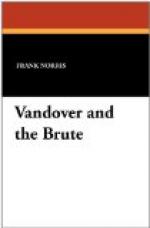Vandover was in the stern upon the hurricane deck, shaking his hat toward his father, who had tied his handkerchief to his cane and was waving it at him as he stood upon an empty packing-case. As the throng of those who were left behind dwindled away, one by one, Vandover could see him standing there, almost the last of all, and long after the figure itself was lost in the blur of the background he still saw the tiny white dot of the handkerchief moving back and forth, as if spelling out a signal to him across the water.
The fog drew a little higher as they passed down the bay. To the left was the city swarming upon its hills, a dull gray mass, cut in parallel furrows by the streets; straggling and uneven where it approached the sand-dunes in the direction of the Presidio. To the right the long slope of Tamalpais climbed up and was lost in the fog, while directly in front of them was the Golden Gate, a bleak prospect of fog-drenched headlands on either side of a narrow strip of yellow, frothy water. Beyond that, the open Pacific.
A brisk cannonade was going on from the Presidio and from Black Point, and both forts were hidden behind a great curtain of tumbling white smoke that rolled up to mingle with the fog. Everybody was on that side of the deck watching and making guesses as to the reason of it. It was perhaps target practice. Ah, it was a good thing that the steamer was not in line with the target. Perhaps, though, that was the safest place to be. Some one told about a derelict that was anchored as a target off the heads, and shot at for fifteen hours without being touched once. Oh, they were great gunners at the Presidio! But just the same the sound of cannon was a fine thing to hear; it excited one. A noisy party of gentlemen already installed in the smoking-room came out on deck for a moment with their cards in their hands, and declared laughingly that the whole thing was only a salute in the Santa Rosa’s honour.
By the middle of the afternoon, Vandover began to see that for him the trip was going to be tedious. He knew no one on board and had come away so hurriedly that he had neglected to get himself any interesting books. He spent an hour or two promenading the upper deck until the cold wind that was blowing drove him to the smoking-room, where he tried to interest himself in watching some of the whist games that were in progress.
It surprised him that he could find occasion to be bored so soon after what had happened; but he no longer wished to occupy his mind by brooding over anything so disagreeable and wanted some sort of amusement to divert and entertain him. Vandover had so accustomed himself to that kind of self-indulgence that he could not go long without it. It had become a simple necessity for him to be amused, and just now he thought himself justified in seeking it in order to forget about Ida’s death. He had dwelt upon this now for nearly four days, until it had come to be




